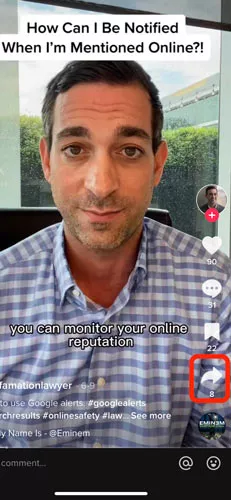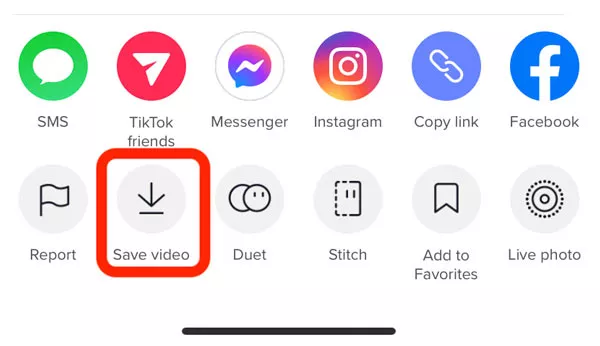
- Originally Published on July 29, 2022
What to Do If You Are the Target of TikTok Defamation
TikTok’s greatest strength—its intuitive algorithm and extremely viral nature—is also one of its greatest weaknesses. If a user slanders you on TikTok, it is all too easy for their video to “go viral” and for thousands (or millions) of other users to hear harmful statements about you.
In today’s extremely online world where your digital reputation can have a massive impact on your real life, it is essential to know what to do if you are defamed on TikTok. If you are a victim of TikTok slander, we recommend taking the following steps:
- Set your social media profiles to private and block the harasser;
- Preserve and save all evidence of the defamation via screenshotting tools or professional preservation software;
- Report, flag, and request removal of defamatory content for Terms of Service (ToS) and Community Guideline violations; and
- Work with an experienced defamation attorney to explore your legal options for responding to and removing TikTok defamation.
At Minc Law, we have proven experience stopping social media harassment and removing defamatory content from sites like Facebook, Twitter, Twitch and TikTok. We know how to deal with online abuse, identify anonymous posters, and resolve these delicate situations efficiently while bringing as little attention to the matter as possible.
In this article, we will explain how to determine if you are being slandered on TikTok and how to prove that a statement is defamatory. We also discuss the steps to take if you become a victim of TikTok defamation.
Let us help. Contact us for a free consultation with an intake specialist to help you explore your removal options and craft an effective strategy.Are you the target of defamation?
What is Considered Slander on TikTok?
In most cases, slander on social media is a misnomer, since most social media platforms use written communication—and written defamation is in fact libel. But since TikTok is a unique platform that consists mostly of videos, defamatory statements on that platform could be considered both slander and libel.
Slander on TikTok is a form of social media defamation, which is defined as content or statements that defames a person or business. Other terms for this type of content include:
- Cyber defamation,
- Character assassination,
- Disparagement, and
- Cyber harassment.
What is the Definition of Slander?
Defamation is the act of communicating or publishing a false statement about a third party that causes damage to their reputation. Slander is one of the two core types of defamation.
If defamation is written or preserved in a tangible medium, it is considered libel; spoken defamation, on the other hand, is slander. An easy way to remember the difference between the two is that “slander” and “spoken” both start with an “S.”
For the purposes of this article, ‘slander’ and ‘defamation’ will be used interchangeably.
Common Examples of Slander on TikTok
Like most social media platforms, defamatory statements can be made in any of the communication methods on the TikTok platform, including:
- Original videos,
- Stitch and duet videos,
- Live streams,
- Comments and replies to comments on a post, and
- Captions under videos.
In one famous example of TikTok defamation, viral TikToker Ava Louise created a video with an unsubstantiated claim that rapper Kanye West and beauty guru Jeffree Star were having an affair. There is no evidence to this claim, and it appears that Louise fabricated the theory to garner views.
Due to the reputational damage this video could create in the lives of these two celebrities, it could easily be grounds for a defamation claim.
What Can Happen If You Are Slandered on TikTok?
Due to the nature and accessibility of the platform, it is extremely easy for content to go viral on TikTok. TikTok users do not need to subscribe to or follow any creators to see their videos. The “For You” page simply pushes videos that the algorithm thinks the user will enjoy or find interesting.
TikTok’s algorithm is influenced by the amount of engagement a video receives, which means that video views can increase exponentially and without warning. Thousands—or even millions—of users could view the defamatory content within hours.
If a TikTok content creator makes a defamatory video about you, it could easily go viral and do a great deal of harm to your reputation. That is why it is vital to act quickly to mitigate the damage.
Why is Slander on TikTok Dangerous to Your Reputation?
TikTok defamation can create serious, life-changing consequences for the victim. Every TikTok video has the potential to go viral, which means that an otherwise unknown victim could become famous (or infamous) almost overnight.
Depending on the lies the defamer spreads, the victim might experience disruptions in their personal relationships, career and business losses, and negative effects on their mental and physical health.
And the defamer can also experience negative consequences from shaming someone on social media. A shamer might face public backlash if their TikTok video goes viral and is poorly received—in fact, they may also become the target of defamation themselves. And the platform may take down the defamatory content and penalize the defamer by muting their account altogether.
And of course, slander on TikTok can result in a defamation lawsuit. Lawsuits can be both costly and time-consuming for both the plaintiff and the defendant.
What You Need to Prove TikTok Defamation
Before deciding whether to file a defamation lawsuit, you should understand what is required to have a valid defamation case. In this section, we discuss the elements required for slander, as well as how to gather evidence of such a claim.
What is Needed to Prove Slander on TikTok?
To assert a valid slander claim in court, you will need to plead the following four elements of defamation:
1. A False Statement Was Made About the Plaintiff
First, defamation must contain a false statement of fact. In other words, a statement of opinion would not count as defamation, as it can not be verifiably proven as true or false.
For example, “John is a jerk” is a vague statement of opinion, while “John cheated on his wife with Sally” is a statement of fact that can either be proven or disproven. Only the latter statement could potentially be defamatory.
Also, to qualify as defamatory, a reasonable hearer should understand that the false statement is specifically referring to the plaintiff.
2. The False Statement Was Communicated to a Third Party
Next, the defamatory statement must have been communicated to a third party. In the context of slander, the untrue statement must have been heard by at least one other person besides the plaintiff.
3. The Defendant Acted With at Least a Negligent Level of Intent
The slanderer must have also communicated or published the false statement negligently. In other words, the speaker did not take the reasonable steps an ordinary person would take before communicating the statement to a third party.
For public figures and officials, the standard of proof is higher than negligence. In these cases, the defendant must have acted with actual malice or reckless disregard for the statement to be considered defamatory.
4. The Statement Caused Damage to the Plaintiff
Finally, the statement must have caused actual harm to the plaintiff’s reputation. If the defamatory statement falls within the slander per se category, damages will be presumed. But if your claim is not considered slander per se—or if you simply wish to strengthen your case—you must establish damages, such as:
- Financial loss like lost revenue, employment, and future business losses;
- Physical and/or mental distress such as depression, anxiety attacks, or high blood pressure; and
- Expenses incurred like content removal services, attorney fees, and PR costs.
TikTok’s Terms of Service & Community Guidelines
If you are the victim of a defamatory statement on TikTok, another consideration to keep in mind is whether the statement violated TikTok’s Terms of Service and TikTok’s Community Guidelines. If the statement in question violates TikTok’s rules, it may be possible to compel the platform to take down the offending content.
For instance, TikTok’s terms of service prohibits “any material which is defamatory of any person.” And the community guidelines prohibit “harmful misinformation”—although to be considered misinformation, it must cause “significant harm” beyond simply inaccurate information that causes reputational harm.
How Can You Gather Evidence For Slander on TikTok?
If you are defamed on TikTok, it is essential to save the defamatory content as soon as possible. Posts and videos can disappear as quickly as they appear, which is why you should save copies to your own device.
When filing a defamation suit, preservation of evidence is essential in demonstrating who said what—and about whom.
It is possible to download videos directly from the TikTok app. Simply open the video in question and press the arrow icon on the right side of the screen.

Tap Save video to download the video to your phone. You can also report the video from this screen.

Some TikTok creators do not allow their videos to be shared or saved. If the poster did not enable downloading, you can use a screen recording tool like TTDownloader or TikMate to capture the defamatory video.
It is also recommended to take a screenshot of the video’s URL, relevant comments, and the account’s profile.
What Can Happen If You Do Not Have Enough Evidence to Prove Slander on TikTok?
If you are unable to save the video or access the account’s information, another strategy to combat TikTok slander is to enlist the help of law enforcement. They may be able to have the relevant content preserved through TikTok’s preservation request system.
Without enough evidence to prove slander on TikTok, you will likely be unable to sue for slander or defamation. When filing a complaint, evidence is essential for both proving defamation and for establishing actual harm or damage.
Reputational damage can be subjective, so it is essential to quantify it as best as possible. Make sure to collect evidence of the harm you or your business have suffered due to the slander, including financial records, medical records, and evidence that your personal life and relationships have been harmed.
What to Do If You Are the Victim of TikTok Slander
It can be traumatic to be slandered on social media, especially when the defamatory statement goes viral. If this situation has happened to you, take the steps listed below to stop online defamation, fight back against harassers, and restore your reputation.
How Do You Know If You Are the Victim of TikTok Slander?
Due to the viral nature of TikTok, defamatory statements can easily spread like wildfire. The good news is that if you are defamed on TikTok, you will likely find out about it shortly after the statement has caught the general public’s attention.
There are several potential signs that you have been victimized by a slanderer on TikTok, such as:
- You start receiving messages or being tagged in comments and posts from third parties mentioning the defamation;
- Your friends and family start reaching out to you regarding what they saw on TikTok about you;
- The harmful content appears on your For You page;
- Other TikTok users “duet” the video in question, causing it to reach a wider audience (a duet is a side-by-side with the original video); or
- Other TikTok users “stitch” the video in question (a stitch starts with part of the original video, then adds the new creator’s reaction or response).
All of the above signs can serve as evidence of defamation.
What Should You Do If You Have Been Slandered on TikTok?
If you are being slandered in TikTok videos or posts, act quickly to mitigate the damage. We recommend that you:
- Set all of your social media profiles to private and block the harasser(s),
- Preserve evidence of the defamation,
- Review TikTok’s Community Guidelines to see if the content violates the platform’s rules,
- Report the slander to TikTok if possible,
- Refrain from responding directly to the defamer, and
- Reach out to online defamation and reputation management professionals to help you recover your online reputation as soon as possible.
We cover each step in more detail below.
1. Adjust Your Social Media Privacy Settings & Block the User
At Minc Law, we have seen countless clients whose public social media profiles rendered their content vulnerable to malicious actors. To protect yourself from social media defamation—even if you have already been the victim of slander on TikTok—we recommend setting all of your social media accounts to private.
You should also block the defamer’s account so that they cannot contact you or see your profile. The more you protect your privacy on social media, the more difficult it is for defamers and harassers to find and use personal information about you.
2. Preserve & Save the Content
Next, gather as much evidence of the TikTok slander as possible. As mentioned above, you can save TikTok videos by tapping the arrow icon on the video, then tapping Save video. You can also use third-party screen recorders to preserve videos with limited sharing settings enabled.
It is also a good idea to save any other proof of how far the slander has spread, including:
- Messages from friends and family about the defamatory statement(s);
- Comments and messages on TikTok and other platforms referring to the defamatory statement(s);
- Other TikTok users’ duets with the original video; and
- Other TikTok users’ stitches with the original video in question.
3. Review TikTok’s Community Guidelines & Terms of Service (ToS)
TikTok may remove the offending content if it violates the platform’s Community Guidelines against expressions of abuse. You may want to report the content if it:
- Insults or disparages another individual based on attributes such as intellect, appearance, personality traits, or hygiene;
- Encourages coordinated harassment;
- Wishes death, serious disease, or other serious harm to an individual;
- Depicts willful harm or intimidation, such as cyberstalking or trolling;
- Disparages victims of violent tragedies; or
- Degrades others using TikTok’s interactive features (e.g., duet and stitch).
4. Report, Flag, & Request Removal of Defamatory Content
If you think the content violates TikTok’s Community Guidelines, you can report the content to TikTok in the hopes that the platform will take it down.
To report a TikTok video, simply:
- Navigate to the video in question,
- Press and hold down on the video, and
- Tap Report and follow the instructions to submit a report.
To report a defamatory comment, take the following steps:
- Navigate to the comment you would like to report,
- Long-press the comment, and
- Tap Report and follow the provided instructions.
To report a TikTok account:
- Navigate to the user’s profile,
- Tap the 3-dot icon in the top right of their profile, and
- Tap Report and follow the instructions to submit a report.
Due to near-blanket immunity and protections granted to internet platforms under Section 230 of the Communications Decency Act, TikTok will not work to determine if the content is defamatory. If the statement(s) in question do not obviously (and objectively) violate the platform’s Community Guidelines, TikTok will likely take no action at all. If you feel a TikTok post is defamatory but TikTok will not take it down, you should consult with an experienced defamation attorney to determine your next steps.
5. Refrain From Responding to the Defamer on TikTok
Although it can be tempting to respond right away to false and harmful statements about you on social media, you should avoid doing so in most cases. Not only do you risk saying something potentially defamatory out of anger, but a response can trigger the Streisand Effect and draw more unwanted attention to the matter.
6. Sign up for a Digital Risk Protection Service
If you are under attack from online harassers, it is worth enlisting the help of a digital risk protection service to monitor your online footprint. Digital Risk Protection (DRP) is the practice of using online tools and industry expertise to identify, track, and prevent potential threats to your online reputation.
Who Can You Reach Out to If You Have Been Slandered on TikTok?
If you have been the victim of TikTok slander, you are not alone. You can contact the following entities for help:
Experienced Internet Defamation Attorneys
If you feel you have a valid defamation claim, you should reach out to an experienced internet defamation law firm. Internet defamation attorneys are well-versed in issues of online harassment and can inform you of your legal options.
They can also help you uncover anonymous posters, file a defamation lawsuit, and obtain a court order to remove content.
Report to TikTok
As mentioned above, TikTok will take down harmful posts and videos that go against its community guidelines and terms of service. If you feel that the social media post in question violates the platform’s rules, report it to TikTok immediately.
Online Reputation Management Agencies & Professionals
Online reputation management (ORM) services can help you protect your overall online reputation, even if you are unable to have a specific TikTok video removed.
ORM companies use a variety of technologies and strategies that go beyond risk assessment, including suppressing negative search results by creating positive content. This content can come in the form of website pages, blog posts, and social media profiles to help “bury” unwanted search results.
Law Enforcement (For Emergency, Unlawful Situations)
If the defamer is threatening you with bodily harm or more malicious intent, you may also wish to report the incident to law enforcement. In such emergencies, law enforcement can submit a law enforcement request to obtain the user’s information and preserve evidence of the harmful content for up to 90 days.
When to Work With an Internet Defamation Attorney to Help With TikTok Slander & Defamation
If you have exhausted all options for handling slander on your own—including following reporting procedures, setting your account to private, and preserving evidence of the slander—it may be time to work with an attorney.
An experienced internet defamation lawyer with proven success tackling social media defamation can help you take additional steps such as reaching out to law enforcement, sending a cease and desist letter, and filing a defamation lawsuit if necessary.
Can You Sue Someone For Slander on TikTok?
Yes, you can sue for TikTok slander. Keep in mind, however, that you cannot sue the social media platform itself. Like Google, Facebook, and Twitter, TikTok is protected by the landmark piece of legislation Section 230 of the Communications Decency Act, and generally cannot be sued for content posted by third parties on its platform. You can however sue the individual poster or commenter.
Video: Why Section 230 of the CDA Should Matter to You

To bring a valid claim of slander in most jurisdictions, you must prove that the statement in question was:
- A false statement of fact,
- Communicated or published about you,
- Made with at least a negligent level of intent, and
- Damaging to your reputation.
What Are My Legal Options If I Am Defamed on TikTok?
If you have been a victim of slander on TikTok, an experienced defamation attorney can help you navigate your legal options. These options include not only filing a lawsuit, but sending a retraction letter, obtaining a restraining order, and pursuing alternative legal claims against the perpetrator.
Consider Filing a Defamation Lawsuit
Victims of defamation on social media can file a defamation lawsuit against the poster or commenter. Keep in mind that lawsuits are costly and time-consuming, so they should always be a last resort.
But if you have experienced extreme financial, emotional, or physical harm due to the slander, a lawsuit may help restore some of what was lost. And if the defamer was anonymous, a John Doe lawsuit can help unmask the perpetrator and obtain a court order to remove the content.
Send a Retraction Demand Letter
Not all legal remedies include litigation. For example, your attorney may send a cease and desist letter or demand for retraction to the defamer.
These letters are more cost-effective than taking the matter to court, and they show the perpetrator you mean business. The perpetrator may take the defamatory post down themselves—and even apologize publicly—after receiving a demand or retraction letter.
Obtaining a Restraining Order Against the Defamer
Another option is to obtain a restraining order against the poster. Restraining orders are not only helpful for protecting your physical safety against a harasser; they can prevent the perpetrator from continuing to spread false information.
Pursuing Alternative Legal Claims
Depending on the nature of the defamation, there may be other legal remedies available to you. For instance, if the post involves a copyrighted picture of yours, you may be able to file a copyright infringement claim against the harasser.
Other alternative legal claims to defamation include:
- False light,
- Invasion of privacy, and
- Breach of contract.
What Can an Internet Defamation Attorney Do For You If You Have Been Slandered on TikTok?
If you are a victim of slander, an internet defamation attorney can be an invaluable resource. Experienced defamation attorneys can help you in the following ways:
Keep You in Check With the Statute of Limitations
The statute of limitations is the legal time frame for a plaintiff to file a lawsuit against a defendant. If you attempt to bring a defamation claim after the statute of limitations has passed, the judge will likely dismiss your case.
In most states, the statute of limitations for defamation is 1-3 years after a defamatory statement was communicated or published. But the statute of limitations can vary by state, which is why it is best to hire a defamation attorney with experience in the jurisdiction where you plan to file your lawsuit. They can advise you and keep you on track so that you do not miss your filing window.
Help With Flagging & Reporting the Content
A legal team that is experienced with social media defamation can help navigate the often complex processes involved in reporting defamatory content on various platforms. They can contact social media moderators on your behalf, as well as help you find and save necessary evidence for making your case to the moderation team.
Take Additional Action to Have the Content Removed
Experienced defamation attorneys can draft additional documents to increase the likelihood of getting the defamatory TikTok posts removed.
For instance, they can send a cease and desist letter, a demand or retraction letter, or file suit to obtain a court order or restraining order against the perpetrator.
Work With Law Enforcement or TikTok to Preserve Evidence
Finally, an internet defamation lawyer can work alongside local police and law enforcement to submit preservation requests for user data.
These emergency requests can prevent harassers from deleting any trace of their defamatory statements. If your defamer erases evidence of their posts, it can be difficult to bring legal action against them or bring perpetrators to justice.
We Can Help Put an End to Defamation & Abuse on TikTok
At Minc Law, we know how overwhelming and stressful being the target of social media defamation can be. We also know just how quickly it can spread and go viral.
We have extensive experience removing defamatory and negative content such as comments, videos, and posts from popular social media sites and applications like TikTok, Facebook, Twitter, and Instagram. We work swiftly and efficiently to remove damaging content and avoid drawing unwanted attention to the matter.
★★★★★
“I highly recommend the Minc Law firm. Not only were they knowledgeable, professional and timely in resolving my matter, but they were a pleasure to work with. Dan, Darcy and Melanie thank you for everything! My only regret was not engaging the firm earlier.”
E.
Oct 4, 2021
If you are the target of slander or defamation on TikTok and want to explore your options to either remove the defamatory content or put an end to the online abuse, we can help. Reach out to schedule your no-obligation, initial defamation consultation with an intake specialist by calling us at (216) 373-7706, speaking with a Chat representative, or filling out our online contact form.
Get Your Free Case Review
Fill out the form below, and our team will review your information to discuss the best options for your situation.
This page has been peer-reviewed, fact-checked, and edited by qualified attorneys to ensure substantive accuracy and coverage.




